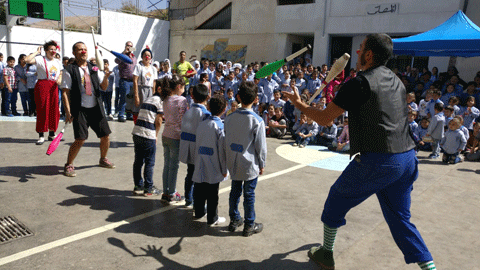The UAB's UTCCB and Pallassos Sense Fronteres positively value their work in Lebanon

25/10/2018
The Trauma, Crisis and Conflict Unit of Barcelona (UTCCB) of the Faculty of Psychology at the UAB, and Pallassos Sense Fronteres (PSF) offered a double presentation in Madrid and Barcelona on 24 October to present the initial results of their work with refugee children from Syria living in Lebanon. Thier project also receives funding from the Nous Cims Foundation. According to UTCCB researcher Alicia Álvarez, the performances by the clowns "improved the sensation of quality of life and the mood" of refugee children who had experienced traumatic situations.
Álvarez took part in the Barcelona presentation, which took place at the Teatre Lliure, together with president and founder of PSF Jaume Mateu (a.k.a. Tortell Poltrona), who also participated in the project. The researcher explained that the performance of the clowns has "a direct affect on the symptoms of post traumatic stress" and she verified that this positive effect continues "three months after the clowns had left".
Jaume Mateu affirmed that PSF "had an intuition about these theories 25 years ago" which are now "no longer just intuitions". The manager and head of operations at PSF, Carles Requena, was not able to speak at the presentation, but speaking on his behalf Marta López declared that "at Pallassos Sense Fronteres we were convinced from the first day we entered a refugee camp of the enormous importance of providing emotional support to those who have undergone traumatic experiences".
That same day, at the head offices of the AISGE Foundation in Madrid, a parellel presentation took place with PSF member and artist Nacho Camarero, who participated in the first journey to Lebanon, and actor and also member of PSF Pepe Viyuela, as well as the PSF delegate in Madrid Jesús González and lecturer at the UAB Department of Social Psychology and Director of the UTCCB Ingeborg Porcar. The results of the research will be published soon in the Journal of Traumatic Stress.
Three Journeys
Eighteen months ago, the PSF and the UTCCB decided to join forces to offer the maximum possible effects with their actions, aimed at reducing post traumatic stress in refugee children who have suffered the wars of the Middle East. Both parts proposed working on a joint project in Lebanon's Beqaa Valley, offering performances at schools of the area, located close to the border with Syria and where refugee students arrived to study in the afternoons. From the month of September 2017 to February 2018, PSF travelled a total of three times to Lebanon in which a dozen of other artists also performed at five schools, all of which formed part of the resesarch project.
Children and adolescents are not only the most vulnerable members of a population exposed to wars, crises and natural disasters, they also represent the future of their country when these traumatic experiences end. Thus, it is very important to invest in their recovery after a crisis, not only to help them overcome their suffering, but also to create an emotional condition in which they can learn, continue to develop and improve their future.
The initial idea for the project was to assess the effect PSF actions would have and establish a relation with the Teaching Recovery Techniques (TRTs) methodology. These techniques, created by the Children and War Foundation in 1997, aim to provide children who have suffered from severe trauma, such as experiencing a war, with strategies to help them identify their reactions and control them in order to improve their emotional state. A combination of this methodology and the PSF performances aimed thus to reduce the symptomatology of their post traumatic stress (nightmares, flashbacks, fear of noises, aggressive behaviour, etc.) in a more efficient manner.
The pilot study included a sample of 220 children from Syria, aged 7 to 14 years old and divided into four groups. The control group did not receive any treatment initially, group I received visits from the clowns, group II followed TRT rehabilitation programme and group III received both treatments, TRTs and clowns. The initial hypothesis was that the children receiving both treatments would obtain better results than those receiving only one or none. In the majority of cases, the hypothesis proved to be true: the combination of treatments resulted in a relevant reduction in the depressive symptomatology of the children. The most surprising element, however, was that the PSF actions on their own, with combining them with TRTs, were also positive in relieving some of the symptoms, such as intrusion, avoidance and conduct.
Measurable Effects
The results of this pilot test demonstrates that the PSF performances had a measurable effect on the emotional state, depressive symptomatology related to post traumatic stress, and conflictive behaviour of the children. The importance of this research lies not only in the improvement of their emotional state and behaviour, but also on the fact that this improvement is a guarantee for their future development and their future. It must be pointed out that the results continued to show for at least three months, which is how long the researchers monitored them. These results will be published in a few months in Journal of Traumatic Stress, one of the world's leading journals of quantitative and qualitative studies on post traumatic stress.
PSF, which this year celebrates its 25th anniversary, is now preparing a brand new campaign focused on the importance of laughter, called “Fem riure, fem futur”, with the aim of finding new sources of funding. The short-term objective is to continue their stays at the Beqaa Valley in Lebanon and expand to other centres to reach more children. If the project can raise enough funds and manages to consolidate itself, the format would be replicated in other countries in which the population also suffers from post traumatic stress due to wars or natural disasters.
More information:
UTCCB-UAB